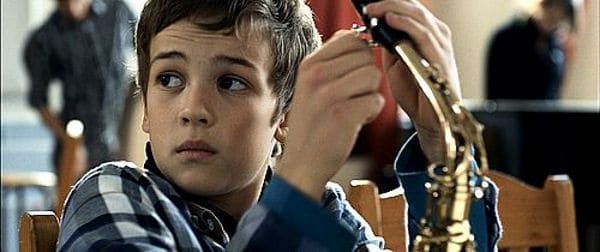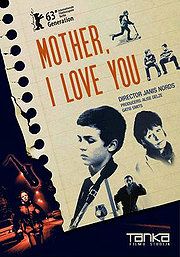Eye For Film >> Movies >> Mother, I Love You (2013) Film Review
Mother, I Love You
Reviewed by: Amber Wilkinson

How does it feel to be a stressed out child? One who is a little bit scared most of the time, nerves always on the verge of jangling? Janis Nords lets us a taste that tension as he tells the story of Raimonds (Kristofers Konovalovs) in Latvia's entry for this year's Foreign Language Oscar. Like most youngsters he loves the freedom of sailing through the streets of Riga on his kick scooter but, once he's off his ride and in the company of adults there's something altogether more guarded about him, his eyes flitting, his guard permanently up.
These are the telltale signs of trouble behind the closed doors of the small apartment Raimonds lives in with his harried single mum (Vita Varpina). Her job involves shiftwork and unpredictable hours, a recipe for tiredness and frustration, giving her a tendency to lash out at the only person handy - her son. Nords keeps control and is out to show how even minor instances of domestic violence can resonate in disturbing ways - Raimonds isn't on the end of violence without end, but on the wrong day, with the wrong piece of news about trouble at school, he can soon find himself on the wrong end of a slap.

Trouble at school is something that Raimonds, understandably, would rather keep to himself - after all, his mother is clearly keeping a raft of secrets from him and sympathy is in short supply on the best of days. The only trouble with trouble is, the more he tries to dig himself out of it, the deeper he gets. Nords gets an excellent performance from Konovalovs - contrasting the enjoyment of the wide open spaces of his home city at night with the stress that waits for him inside his home or school. He and cinematographer Tobias Datum have a loose and realistic style, recalling the likes of Truffaut and the Dardennes Brothers but retaining their own sense of identity behind the camera.
A troubled childhood may sound like a familiar tune, but tension pulls tight as a violin string and we see dangers that Raimonds cannot, in contrast to the adults around him, who are so inwardly focused that they unaware of their own failings and the consequences. The film is not just for adults but for older children, who will find much to sympathise and root for in Raimonds' plight. Sometimes, just reaching out can be perilous - but we long for someone to take the risk.
Reviewed on: 29 Mar 2014















